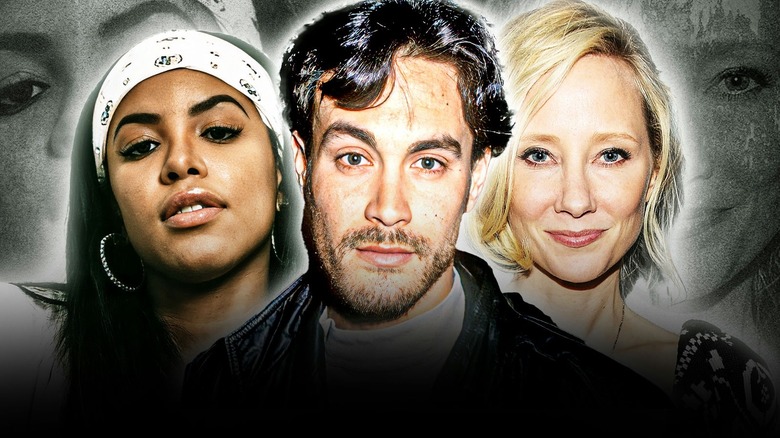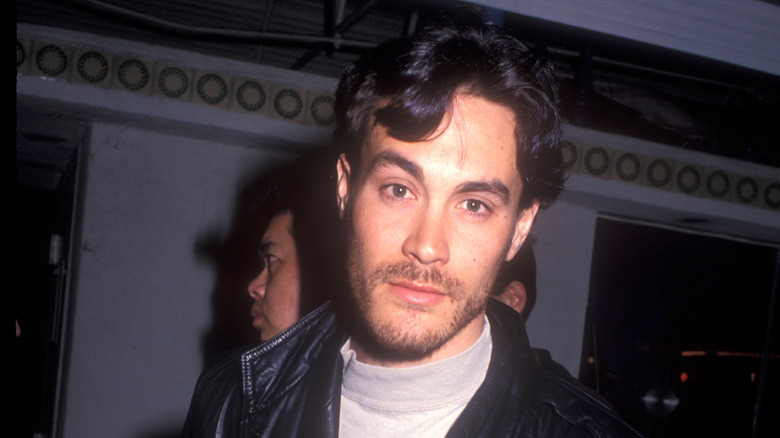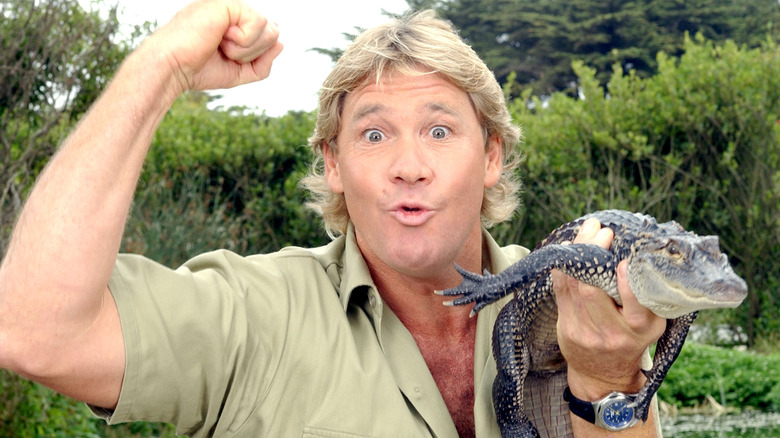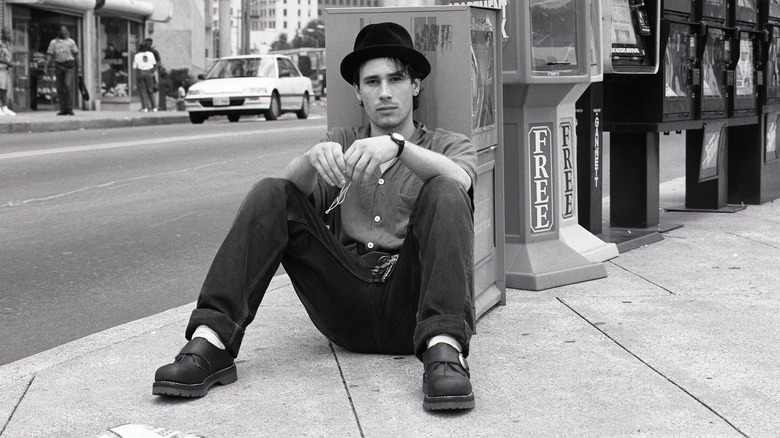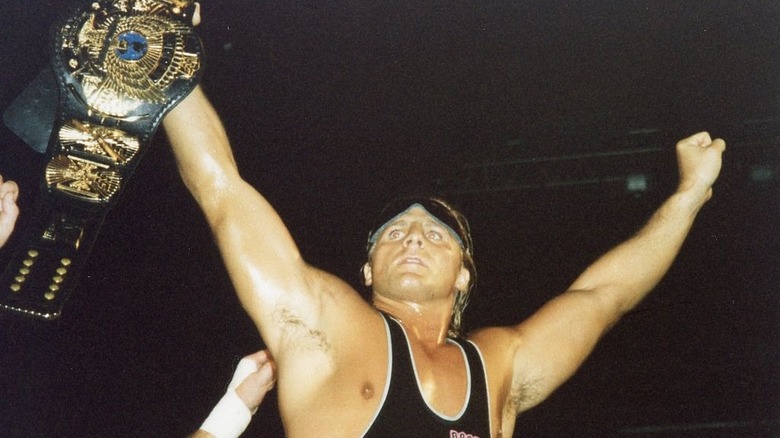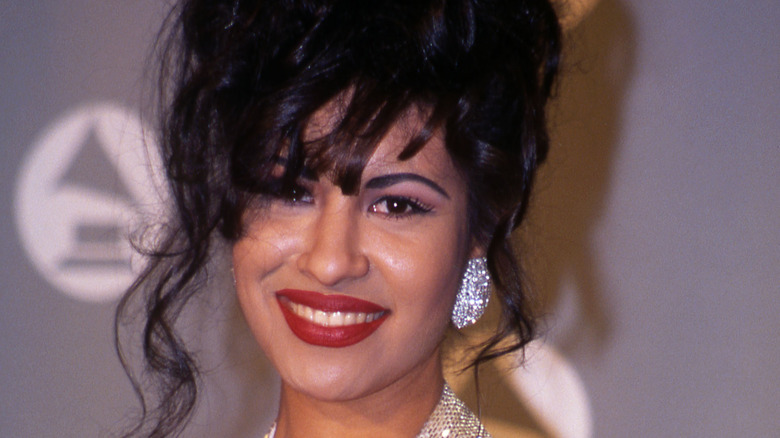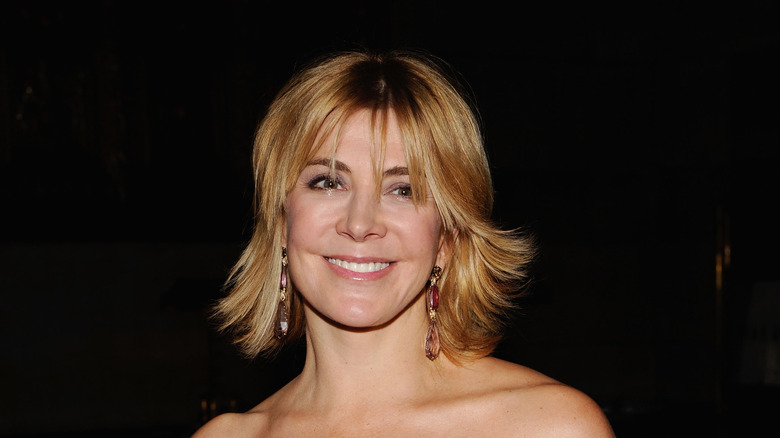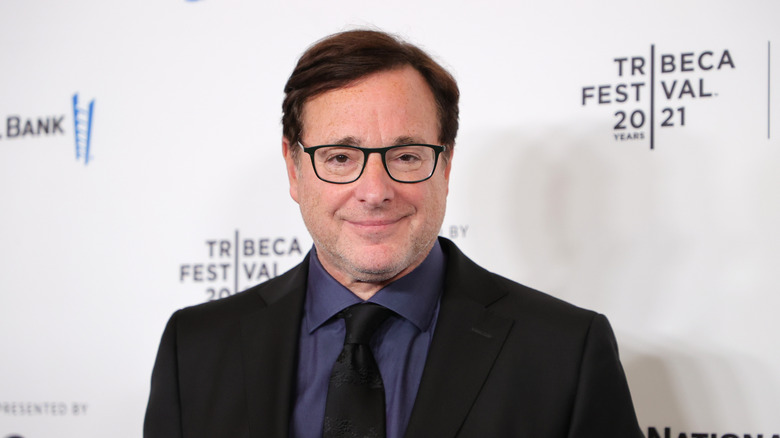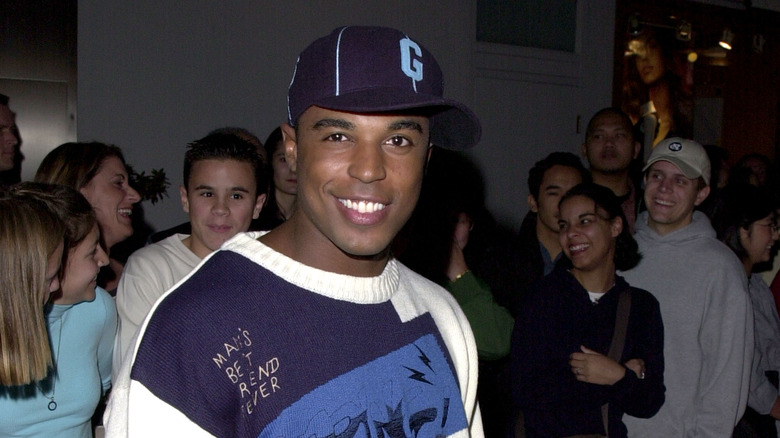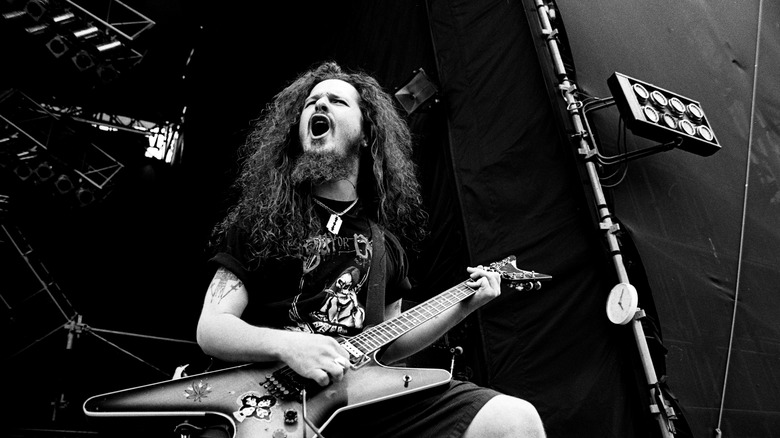'90s Stars Who Died In Bizarre Ways
The 1990s certainly don't feel like they were several decades ago, but a look back at that era's pop culture reveals a significant gap between then and now. For a start, '90s celebrities often found fame through different means, and while sitcom stars, stand-up comedians, singers, and professional athletes may stand the test of time, social media sensations are a bit more common in the modern day. Nonetheless, in the intervening decades, many '90s icons have faded into obscurity and fallen prey to the relentless march of time, occasionally under truly bizarre circumstances. Some sitcom stars even died without anyone noticing.
A celebrity death comes with so many additional complications. An average person might expect to appear in the obituaries after their death, but for a celebrity, such an event will likely take the tabloids and all other outlets by storm, and any suspicious circumstances can become multi-week narratives. In addition, a famous person's lifestyle can open them up to more strange and unexpected events with tragic outcomes, such as crazed fans, dangerous lifestyles, and endless other potential risks. Thanks to a combination of those unique elements and the passing of several decades, there are plenty of '90s stars who died in bizarre ways.
Brandon Lee
Brandon Lee was 28 and in the prime of his career when he died. As the son of the legendary Bruce Lee, the younger Lee was destined for a life as both a movie star and martial arts icon. He started his career with a few Hong Kong productions before transitioning to Hollywood in the early 1990s, eventually finding the role that was supposed to launch him into the upper echelon. Lee was inarguably perfect in "The Crow" and delivered one of the finest performances in the history of the superhero genre, but the production became eternally cursed by his tragic onset death.
Shortly after midnight on March 31, 1993, actor Michael Massee fired a .44 Magnum loaded with blanks at Lee. A crew member created the blanks by removing the powder from live ammunition, accidentally creating a charge that launched a bullet fragment from the barrel, striking Lee in the abdomen. Lee died after several hours of intensive surgery and although no criminal charges were filed, Lee's mother filed a civil suit that was later settled for an undisclosed sum.
Lee's tragic death has not been forgotten, and as Alec Baldwin faced charges for an on-set shooting, headlines about Lee became common once again. The 2024 remake of "The Crow" prompted another resurgence of stories about Lee. Perhaps most interestingly, Chad Stahelski, Lee's on-set double and the director of all four "John Wick" films, swore off using real guns in his productions as a result of his experience with "The Crow."
Brittany Murphy
Brittany Murphy made a name for herself in the 1995 classic "Clueless." She portrayed Tai Frasier, the newcomer who becomes Alicia Silverstone's rival after a few key lessons in the finer points of '90s high school popularity. She would go on to star in memorable projects like "Girl, Interrupted," "8 Mile," and "Just Married." Murphy was also a singer, notably providing stellar covers of tracks by Queen and Earth, Wind & Fire as part of her role in "Happy Feet." Modern audiences probably know her best as the voice behind Luanne in 254 episodes of "King of the Hill," and was so integral to the series that it entered a 15-year hiatus after her tragic death in 2009.
Murphy died in December 2009, and her initial autopsy report noted "acquired pneumonia" as her cause of death with multiple mitigating factors, including "iron deficiency anemia" and "multiple drug intoxication." However, her death was not without controversy. After the death of her husband, rumors of toxic mold in their Los Angeles home began to become common. Murphy's mother didn't believe that story at first, but she was reportedly later convinced, which led to a lawsuit. Murphy's mother also issued an open letter to The Hollywood Reporter in 2013, where she argued against claims of foul play, stating: "She died of natural causes. And now she is a real living angel in heaven."
Steve Irwin
The tragic death of "The Crocodile Hunter" lives on in the memory of millions. Steve Irwin took to the wild at an early age and became the proud operator of a small wildlife park in 1991, the year before he married his wife, Terri. He made his first TV appearance in 1997, when "The Crocodile Hunter" debuted. Irwin ran that show for seven years before transitioning into another nature program entitled "The Crocodile Hunter Diaries," which ran for another year. Thereafter, Irwin was a fixture on the small screen. The Irwin couple had two children, who would join their wild lifestyle and carry on their father's legacy.
Irwin died in 2006 after an unprovoked and unprecedented stingray attack. He was snorkeling as part of a production off the coast of Australia when he encountered the typically docile animal who would end his life. Stingrays don't generally attack, and the majority of stingray injuries occur when a person accidentally steps on a stingray's tail, which can deal considerable damage to the unlucky foot. Furthermore, only two other stingray-related deaths were reported in the region between 1945 and 2006. The irony of a man so accustomed to working with dangerous animals dying in a confrontation with a comparably docile creature keeps this event fresh in the mind of Irwin's fan base.
Jeff Buckley
Jeff Buckley fits comfortably into the long list of musicians who weren't appreciated enough when they were alive. Sure, his cover of Leonard Cohen's "Hallelujah" and his soulful ballad "Lover, You Should've Come Over" are now recognized for the masterpieces they are, but they weren't perceived as instant classics at the time of their release. His only studio album, "Grace," spent seven weeks on Billboard's Top 200, never climbing above #149, and almost all of his chart success was posthumous. Buckley's tragic death in 1997 robbed the world of a potentially excellent musical talent far too soon.
Buckley was 30 on May 29, 1997, when he walked fully clothed into a channel of the Mississippi River and drowned, with riverboat passengers noticing his floating body six days later. Despite rumors, Buckley's autopsy report featured a full toxicology report, which confirmed that his blood alcohol level was low and there were no drugs in his system. In an interview with NPR, Buckley's manager, Dave Lory, revealed that Buckley had been acting erratically before his death. Lory recounts Buckley applying for a job at a zoo, trying to buy things that weren't for sale, and doing "a lot of weird stuff that was uncharacteristic for him." Still, Buckley's mother, Mary Guibert, maintains a straightforward account of his death. Speaking to The Guardian in 2002, Guibert called the event "just a sheer, horrible, freak accident that happened so unfreakishly."
Owen Hart
Owen Hart was one of the defining wrestling talents of the 1990s. Born into the notorious Hart wrestling family, the youngest son of Stu Hart followed into the family trade. Hart had a lot of varied gimmicks in his early years, and fans might remember him best for his vicious rivalry with his older brother, Brett "The Hitman" Hart, which culminated in the legendary 1994 WWE SummerSlam Steel Cage Match event. In his "Confessions of the Hitman" interview series, Brett recalled his in-ring rivalry with his brother and the childhood memories they shared, although Hart's tragic death made them painful to recall.
Hart died as a result of an accident during his introduction at the Kemper Arena in Kansas City, Missouri. Dressed in character as The Blue Blazer, Hart was to be lowered into the ring via a harness and rappelling line as a comedic setup before the match. Something went wrong, causing the release to trigger and Hart to fall from a great height. The accident caused a torn aorta and several other internal wounds, eventually leading to his untimely death in a nearby hospital. While the pay-per-view audience didn't see the event, the roughly 16,000 fans present witnessed Hart's accident, and controversially, WWF CEO Vince McMahon chose to continue the broadcast. Hart's family sued the WWF and McMahon, eventually settling out of court for a reported $18 million.
[Featured image by Mandy Coombes via Wikimedia Commons | Cropped and scaled | CC BY-SA 2.0]
Aaliyah
Aaliyah Dana Haughton's music career was heavy with controversy. Aaliyah made waves with her first album, "Age Ain't Nothing but a Number," which dropped in 1994 with an extraordinarily suspicious title and R. Kelly as a credited songwriter/producer. Kelly allegedly married Aaliyah in secret when she was 15, leading Aaliyah's parents to quietly annul the ceremony. However, both parties denied those claims, and the album still sold well. Aaliyah's first and only No. 1 hit was "Try Again," which dropped in 2000 as part of the soundtrack for "Romeo Must Die," Aaliyah's feature film debut. She died tragically only a year later.
Aaliyah died in a plane crash on August 25, 2001. The singer, along with an uncertified pilot and seven passengers, piled into a tiny twin-engine Cessna 402B that was carrying far too much cargo as it prepared to take off from the Bahamas. The vessel crashed almost immediately, killing all nine people aboard. Aaliyah's parents, Diane and Michael Haughton, sued the music video production company that arranged transportation and the company that operated the Cessna. Both reached settlements in the early 2000s.
Aliyah's tragic death remains in the minds of many. In 2024, Aaliyah's uncle and the owner of her original masters, Barry Hankerson, finally released the artist's 1996 album, "One in a Million," on streaming, celebrating the fans for "keeping her music alive."
Selena
Selena Quintanilla Perez sits in third place on Billboard's Greatest of All Time Latin Artists, and deservedly so. Contemporary outlets frequently compared her to Madonna, both in her fashion sense and vocal talent. She started singing at nine and became a more notable talent in 1987, when she won a Tejano Music Award, and almost all of Selena's hits were in Spanish. Her star kept rising far beyond her tragic death: Selena's third studio album, "Entre A Mi Mundo," went gold in 1995 — the year she died — and then diamond in 2017.
Selena was murdered in 1995 when she was 23 years old. Her killer, Yolanda Saldivar, was a former nurse who became the president of Selena's official fan club and a partner in several of her businesses. Saldivar allegedly embezzled funds from Selena's fans and customers, which prompted Selena to arrange a meeting in a Corpus Christi motel room, where she would presumably fire Saldivar. However, Saldivar shot Selena in the shoulder. Selena escaped the room and managed to identify Saldivar as her killer before she collapsed in the hotel lobby, leading to a nine-hour confrontation between Saldivar and the police. Selena died in a nearby hospital, and Saldivar eventually received a life sentence for her murder. Selena's funeral drew more than 30,000 attendees, all eager to pay their respects to the "Queen of Tejano."
Natasha Richardson
Natasha Richardson was born into a showbiz family. Her father was Tony Richardson, a director known for classics like "Look Back in Anger," and her mother was legendary actress Vanessa Redgrave. Richardson attained stardom in the late 1980s and became an icon of the '90s, starring in a selection of well-received hits like "The Handmaid's Tale," "Nell," and "The Parent Trap." In 1994, Richardson entered into a high-minded power couple with Liam Neeson. Richardson settled well into the 2000s, raising her two sons, appearing in a few films, and even hosting the 2002 Tony Awards with her husband. Sadly, her career came to a tragic end in 2009.
On March 16, 2009, Richardson experienced a seemingly minor fall while skiing at the Mont Tremblant ski resort in Quebec. While she wasn't wearing a helmet, she didn't collide with anything while falling and signed herself out of the infirmary. Less than two hours later, paramedics were called to her hotel and she went into the care of a Montreal hospital, followed by a transfer to another medical facility in New York, where she died.
Neeson didn't speak publicly about the death of his wife for several years. In 2014, he spoke to Anderson Cooper for "60 Minutes," where he characterized his grief, stating, "You feel like a three-legged table. Just suddenly, you just—the Earth isn't stable anymore. And then it passes and becomes more infrequent, but I still get it sometimes."
Bob Saget
Bob Saget was the face of TV comedy from the late '80s to the '90s. For eight years and nearly 200 episodes, he starred in the beloved sitcom "Full House," making Danny Tanner feel like America's dad, and was an iconic TV host on "America's Funniest Home Videos." Those two works made him so famous that a lot of fans didn't even know his long history of success in stand-up comedy. He even returned to the realm of fatherly sitcom performances in "How I Met Your Mother" and the Netflix revival of "Full House."
When Saget died in Orlando in 2022, the cause wasn't initially clear. His body was found in his hotel room on January 9, hours after he tweeted his delight with a standup show he'd just performed in Jacksonville. A local medical examiner later concluded that Saget received an accidental blow to the head, suggesting a fall. No drugs were found, and no foul play was suspected.
While that seems like a perfectly normal, if wholly unexpected, cause of death, there are tragic details of Saget's death that the public will likely never know. As of March 2022, a Florida judge permanently prohibited the release of certain records, doing so at the request of Saget's family. The hidden material allegedly includes graphic images and video, as well as some audio recordings.
Merlin Santana
Merlin Santana was a fixture of '90s sitcoms. His first breakthrough saw him play Rudy's boyfriend, Stanley, in seven episodes of "The Cosby Show." He would carry that success forward into several other sitcom roles, including a reoccurring spot on "Getting By," a couple of episodes of "Hangin' with Mr. Cooper," and a few appearances on "Moesha." Santana's biggest role was a central part in "The Steve Harvey Show," but his years of sitcom stardom ended in tragedy with his bizarre murder in 2002.
The tragic murder of Santana took place in Los Angeles, where Santana had just left a friend's apartment and was sitting in the passenger seat of someone else's car when he was shot and killed. The assailants were Damien Andre Gates, 21, and Brandon Douglas Bynes, 25. The third culprit, Monique King, was a 15-year-old runaway who told Gates and Bynes that Santana made inappropriate advances towards her, leading the two men to take action. In 2004, prosecutors won convictions against all three. Gates was convicted of murder and slapped with a 70-years-to-life sentence; Bynes pleaded guilty to manslaughter and received 23 years; and King received eight years in juvenile prison.
Dimebag Darrell
People don't often consider Pantera and its lead guitarist, "Dimebag" Darrell Abbott, a '90s phenomenon, a period that was dominated by grunge icons such as Nirvana. Nevertheless, Pantera released its defining album, "Cowboys from Hell," in 1990. In an interview with Louder, Abbot's equally storied Pantera bandmate, Phil Anselmo, explained the album, stating, "The fact that Dime wrote "Cowboys" was not all that surprising, but it was very clever."
Abbott, who frequently features on lists of the best metal guitarists of all time, died on stage in Columbus, Ohio, when a crazed fan rushed the stage and shot him. Nathan Gale was a former Marine who fired his 9mm handgun a total of 15 times, killing three people, including Abbott. In the chaos, a local police officer emerged and shot Gale dead. Unfortunately, the efforts of paramedics were unsuccessful, and Abbott died at the scene. Abbott's death rocked the music world, and in an interview with Spin, Abbott's partner, Rita Haney, said she believed that Abbott would have resurrected Pantera if he'd lived to see the modern era.
Anne Heche
Anne Heche was as famous for her personal life as she was for her work. She was an actress with roles in films like "Wag the Dog," "Six Days Seven Nights," and "Donnie Brasco" throughout the late 1990s. She was also in a public relationship with Ellen DeGeneres, which was often called the "first gay supercouple." Heche and DeGeneres dated from 1997 to 2000, and after their well-publicized breakup, Heche saw a psychiatrist. She told The Advocate that she was told that she had experienced a "psychotic break," even though she believed herself to be in good mental health.
Heche died in a car crash in 2022. On August 5, she hit a wall in the parking area of a Mar Vista apartment complex, then took off before anyone could help. She quickly crashed again into a nearby home, burying her car deep within the house, which caused a collapse and a massive fire that took over an hour to extinguish. She was seemingly conscious when they pulled her from the wreckage, but Heche's condition deteriorated. She fell into a coma before dying of thermal injuries and smoke inhalation. Her autopsy later revealed no illicit substances in her system, ruling the death an accident.
If you or someone you know needs help with mental health, please contact the Crisis Text Line by texting HOME to 741741, call the National Alliance on Mental Illness helpline at 1-800-950-NAMI (6264), or visit the National Institute of Mental Health website.
